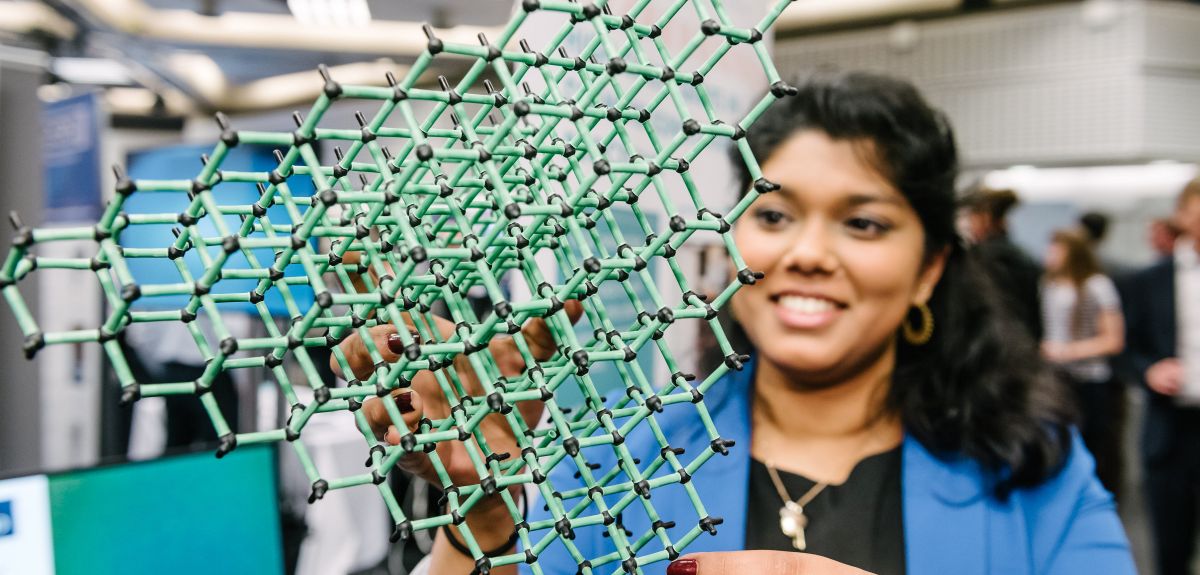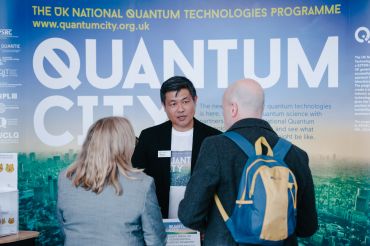
Quantum Technologies Showcase 2018: Turning science into technology and products
By Julia Flynn, NQIT Communications Manager
Earlier this month the Engineering and Physical Sciences Research Council’s (EPSRC) UK National Quantum Technology Hubs successfully delivered the third annual Quantum Technologies Showcase, demonstrating the technological progress emerging from the national research programme.
There were over 80 exhibits, together with briefing sessions that asked ‘Are you ready for quantum?’ For the exhibitors it was a chance to discuss their work and highlight the achievements in quantum technologies in what has been a coordinated national effort. The 700 plus visitors could see the advance of quantum technologies and the potential to benefit their businesses and organisations, as well as for society as a whole.

The Showcase was divided into zones, from transport to defence and healthcare and many more. The Networked Quantum Information Technologies Hub (NQIT), led by the University of Oxford, had nine exhibits showcasing the multiple approaches to building quantum machines based on high performance qubit systems, and emerging quantum information processing technologies. They also had a busy Hub stand that explained the whole work of NQIT, inbuilding the essential systems for the Q20-20 quantum computer demonstrator and creating a world-leading quantum computing economy in the UK.
Participants were able to see demonstrations, showing the enormous engineering progress being made to build the complex systems and components for scalable quantum computers based on different architectures including ion traps and superconducting circuits.
One of NQIT’s stands ‘Create your own qubit in diamond’ demonstrated how its researchers are developing methods to write qubits into diamond using ultrashort laser pulses. Visitors were excited to be able to remotely connect to the laser writing lab in Oxford and control the set up to write their own quibits, creating a single Nitrogen Vacancy in a synthetic high quality diamond.
While many of the exhibits looked at the advances in research, hardware and engineering that are core to building a scalable quantum computer, NQIT spin out applications and companies were also present, such as the random number generator, a patented application from NQIT’s photonics work stream. Oxford Quantum Circuits, one of the three NQIT spinout companies, had a prototype quantum computer at the Showcase, giving visitors the opportunity to perform some quantum logic, based on superconducting quantum hardware.
As well as the buzz and interest in the many exhibits visitors also heard more about the UK Government’s pledge of a further £235 million to support the development and commercialisation of quantum technologies, including up to £70 million from the Industrial Strategy Challenge Fund, and £35 million to support a new national quantum computing centre. This investment is in addition to the government’s £80million extension of the Quantum Technology Hubs and takes overall funding for the second phase of the UK’s world-leading National Quantum Technology Programme to £315 million.
Phase I of the UK Quantum Technology Programme has been a pioneering programme that has transferred scientific leadership into innovation and technological leadership. Phase 2 will build on that work to make the UK the ‘go-to’ economy, creating opportunities for industry and the development of new skills geared toward exploiting these new quantum technologies.